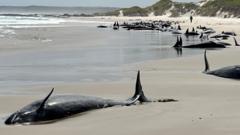In a heartbreaking decision, Australian authorities confirmed they will euthanize approximately 90 false killer whales that survived a mass stranding on a remote beach in Tasmania. The pod of 157 whales beached near Arthur River in the island's north-west, with the rest sadly dying shortly after. Experts noted that complex conditions made rescuing them impossible, as the surviving whales had been stranded for over 24 hours and were under immense stress.
False killer whales, which are among the largest dolphin species and can grow up to 6 meters long, last mass stranded in Tasmania over 50 years ago. Local resident Jocelyn Flint, who visited the site, described the sight of the stranded whales as "absolutely horrific," especially after noticing families and babies among them.
Accessing the site has proven challenging due to rough roads, hindering rescue efforts. Attempts to relocate and refloat the animals were unsuccessful. Given the forecast of continued adverse conditions, wildlife veterinarians made the "tough" choice to euthanize the remaining whales to ensure they do not suffer further. This grim task, expected to begin soon, raises concerns about how the carcasses will be managed, particularly due to the area's cultural significance for Aboriginal people.
Mass whale strandings are not uncommon in Tasmania, where over 80% of Australia's cases occur, with previous incidents involving hundreds of whales. The reasons behind such strandings remain speculative, including theories related to disorientation and communication within highly social whale communities.
False killer whales, which are among the largest dolphin species and can grow up to 6 meters long, last mass stranded in Tasmania over 50 years ago. Local resident Jocelyn Flint, who visited the site, described the sight of the stranded whales as "absolutely horrific," especially after noticing families and babies among them.
Accessing the site has proven challenging due to rough roads, hindering rescue efforts. Attempts to relocate and refloat the animals were unsuccessful. Given the forecast of continued adverse conditions, wildlife veterinarians made the "tough" choice to euthanize the remaining whales to ensure they do not suffer further. This grim task, expected to begin soon, raises concerns about how the carcasses will be managed, particularly due to the area's cultural significance for Aboriginal people.
Mass whale strandings are not uncommon in Tasmania, where over 80% of Australia's cases occur, with previous incidents involving hundreds of whales. The reasons behind such strandings remain speculative, including theories related to disorientation and communication within highly social whale communities.




















